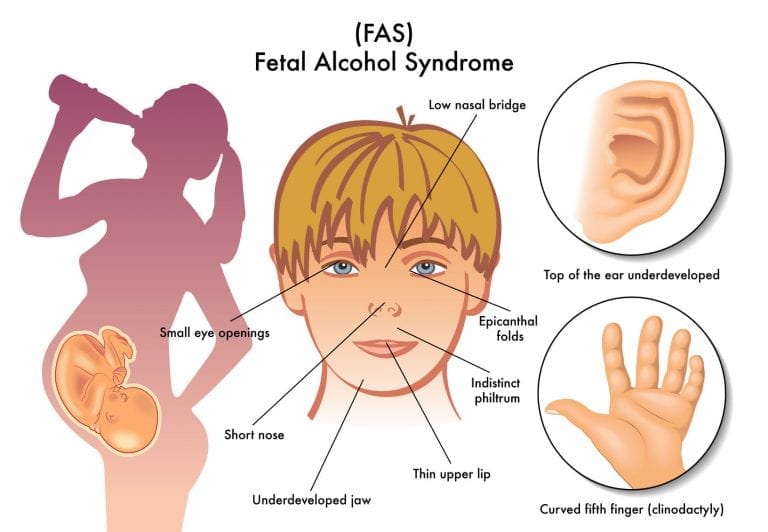“Your daughter has full-blown fetal alcohol syndrome.” Those words hit me like a tsunami. I was drowning in waves of grief, disbelief, horror and remorse. For 15 years, I searched to understand why Karli wasn’t learning and growing stronger, like my other 2 children. Doctors told me ear infections had caused her minor delays, but she would “grow out of it.” Today, Karli is 42 years old; developmentally, she is about 6 years old.
I grew up in the 1960s in an upper middle-class suburban neighborhood. My charismatic father suffered with alcoholism, and my co-dependent mom worked hard to cover his tracks. At 16, I was already experimenting with alcohol and other drugs when I got pregnant, married and dropped out of school. I wanted to have a healthy baby so I gave up all of the drugs and drank apple wine on the weekends.
Effects of Alcohol in Pregnancy
My 1st child, a boy, was born with a clubbed foot, which the doctor told me was a genetic disorder. I had Karli a year later, when the research describing the fetal alcohol syndrome (FAS) was published. A few years later, I gave birth to another daughter and still had never been told not to drink during pregnancy.
I divorced my high school sweetheart and remarried another man who liked to drink. My own issues with alcoholism and addiction spiraled out of control. I had 2 unplanned pregnancies while on methadone to treat my heroin addiction. No one at the clinic ever mentioned that it wasn’t OK to drink. My 2nd son came prematurely and died the day he was born. After a full-term pregnancy with my 3rd baby girl, I found her breathless in her crib at 10 weeks old: Sudden Infant Death Syndrome (SIDS).
No Safe Amount of Alcohol
I didn’t realize how those years of addiction affected each of my children. Most people with FASD don’t have intellectual disabilities, but do have attention deficits, behavioral issues, learning disabilities, mental health issues, and problems with memory, judgment and reason.
Alcohol is a leading cause of fetal brain damage, birth defects and both fetal and infant death, including SIDS. While pregnant, there is no safe amount of alcohol, no safe time to drink alcohol, and no safe type of alcohol.
Clean and sober for the last 31 years, I have dedicated my life’s work to increasing awareness and improving services for individuals with FASD and for women dealing with addiction issues. I have a beautiful marriage and 5 wonderful grandchildren. Later, I went on to receive my Master of Human Services (MHS) degree and became a licensed clinical alcohol and drug counselor (LCADC). I know that treatment works, and by encouraging women to get help, we save their children too. Now I am that good mother I always wanted to be.
If you’re struggling or think your child may be affected by FASD, don’t hesitate to reach out to your nurse, midwife or other healthcare provider. There is no shame in asking for help—your child’s life depends on it.
Fetal Alcohol Syndrome Disorder (FASD)
- FASD’s effects are lifelong—but they’re also preventable
- Alcohol in pregnancy is more harmful than any other recreational drug, including cocaine, heroin and marijuana
- Alcohol can damage a developing baby before you even know you’re pregnant
- FASD is rarely diagnosed, making it an invisible disorder
Source: NOFAS.org
Further reading: Understanding Gestational Diabetes in Pregnancy






Comments are closed.